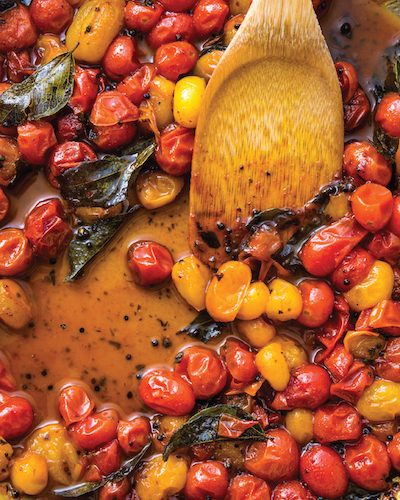Food Revolutionist Chef Preeti Mistry combines Indian heritage and activism.
Oakland has been experiencing a queer culinary boom for some time, and one of the brightest stars on the scene is chef and restaurateur Preeti Mistry of Navi Kitchen, an Indian-inspired pizza cafe, and Juhu Beach Club, a homey-yet-hip bistro specializing in Indian street food.
Oakland is a beacon for artists and activists, and the birthplace of the revolutionary socialist Black Panther Party. “It’s always attracted people who are living their lives the way that want to and not the way that other people prescribe,” says Mistry. “I love my chosen family here, I love the community. Queer women of color have lived here for decades, way before it was cool.
Mistry is a hard-working DIY chef; while we talk she receives mail, takes deliveries, and makes batches of spicy popcorn. She plans to even tually close Juhu to focus on Navi Kitchen but intends Juhu to live on in different forms in the future.
The lovely, colorful and politically inspiring The Juhu Beach Club Cookbook is one such incarnation With the tagline “Indian Spice, Oakland Soul” and blurbed by food guru Anthony Bourdain, it’s a worthy addition to your queer kitchen.
Mistry and her wife Ann Nadeau have been together for 18 years, and as a couple as well as business partners, they have a high profile role in their intersectional community. They see their restaurants as local hubs, with friends dropping in to visit or asking for advice. “Everyone comes in and chats with you about whatever’s going on in the community.
We employ a lot of artists, activists and young people who look to me and Ann when something is going on in our world. I’ve always been involved in a certain amount of social justice. I didn’t decide to become a chef because I wanted to be on TV and get Michelin stars or a James Beard Award.
I went to culinary school because I liked cooking and I liked the way it brought people together.” Mistry first learned the importance of community when she was in her 20s and living in San Francisco where she hosted dinner parties and ran a pop- up restaurant. As part of the Indian diaspora (she was born in London to Indian parents and raised in Ohio), family gatherings and social occasions were prioritized.
Mistry’s restaurants and her book are personal and political. “Cooking the cuisine of my cultural heritage is fucking personal,” she tells me. “When there’s Yelpers and haters out there want to dismiss it as ‘Asian-fusion,’ it feels like they’re missing so much. If you didn’t grow up as an immigrant in this country, there is a certain tendency of reductionism.”
But Mistry has many fans, especially other second generation immigrants who understand the colonial legacy, whether Indian, Caribbean, British or Australian. Juhu redefines Indian-American identity and cuisine. “I feel really proud that I made an impact, that people can see that it’s more than saag paneer, naan and chicken tikka masala—not that I don’t love those things. There’s just so much more.”
Mistry has been outspoken about elitist celebrity chefs appropriating ethnic cuisine to spice up European tradition. “We’re all one industry; whether you have a food truck or a three Michelin-starred restaurant. It’s cooking, plain and simple. It’s infuriating to me how there’s a segment of the industry that thinks they’re the only ones that matter.”
Mistry has described fine dining as ‘disingenuous’. “To think that you can serve the one percent, yet feel good about yourself because you support farmers and ranchers—you’re not the only one.” She’s also critical of the lack of diversity in fine dining. “Just because your dishwasher’s Mexican doesn’t mean you have diversity. Who’s at the top? Who has the power?”
Cultural appropriation is a hot topic these days, in everything from acting, to fashion, to food. “If you’re a white guy cooking Vietnamese cuisine, no one’s telling you you can’t use galangal. Just have some respect and awareness of what you’re doing and be prepared to talk about it.” There’s a disconnect, she says, that has to do with profit. Whereas she’s cooking her mom’s recipes, and has a genuine emotional and cultural connect to that labor. But she’s not above getting back at the appropriators.
“The ongoing joke at Navi Kitchen is ‘colonize the colonizers’.” And the cocktails in The Juhu Beach Club Cookbook wink at the whiteness of cocktails. Sex on Juhu Beach is an improvement of a trashy classic adding chai masala and mango. “We all globally appropriate from each other. It would be terrible if we were all living in our silos.
The difficulty comes in with inappropriate appropriation— when people with privileged back- grounds profit from a culture that doesn’t have that level of privilege and power.”
So take a leaf out of Oakland’s book and grab a copy of The Juhu Beach Club Cookbook. Then get cooking—creatively and consciously.
